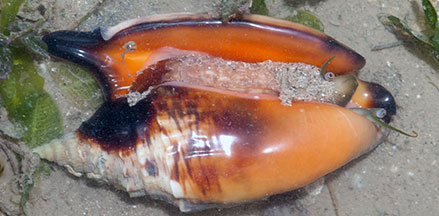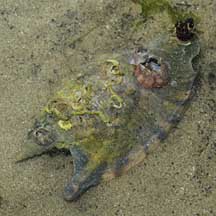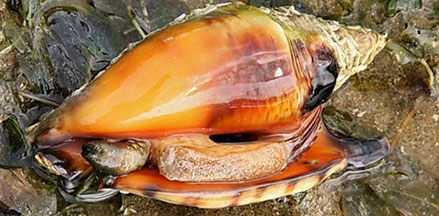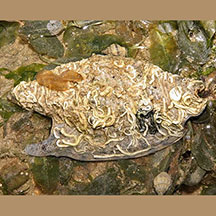 |
|
| shelled snails text index | photo index |
| Phylum Mollusca > Class Gastropoda > Family Strombidae |
| Dark
Diana conch Euprotomus aratrum Family Strombidae updated Sep 2020 Where seen? This amazing conch is sometimes seen on Changi in a lush seagrass meadow. Elsewhere it is considered moderately common in shallow water near reefs, grassy sand flats and coral rubble to 10m deep. It was previously known as Strombus aratrum. Features: 7-9cm long. Shell thick heavy large, lip flared with one prong. Upperside usually covered with encrusting plants and animals, hiding a pattern of dark brown bars. The inner portion of shell opening is pearly and orange and there are brown stains on the underside. The flared shell protects the long proboscis as the animal sweeps the bottom for titbits. Large eyes on eyestalks, each eyestalk has a tentacle, the purpose of which is not known. Like other conch snails, it hops using the knife-like operculum at the tip of a long muscular foot. |
 Changi, Apr 09 |
 |
| According to Abbott, Strombus aratrum is a subspecies of S.
aurisdianae. 'Auris' means 'ear' and indeed, the beautiful underside
of S. aurisdianae may be what the ear of the goddess Diana
looks like, hence the common name Diana
conch or Diana Ear conch. S. aratrum is more elongate and has
a brown-stained shell opening. Thus its common name is Dark Diana
conch! Human uses: S. aurisdianae is collected for food where it is abundant. The shell is used in shellcraft. It is sold in local markets of the central and northern Philippines. Status and threats: S. aratrum (spelt S. atratum in the Red Data Book) is listed as 'Critically Endangered' in the Red List of threatened animals of Singapore. The Red Data Book states it as being found near our coral reefs and was present in small numbers until the 1960s. It was rarely seen since then and possibly "now wiped out". |
| Dark Diana conch snails on Singapore shores |
On wildsingapore
flickr
|
| Other sightings on Singapore shores |
 Changi, May 09 Photo shared by James Koh on flickr. |
 |
|
Links
References
|